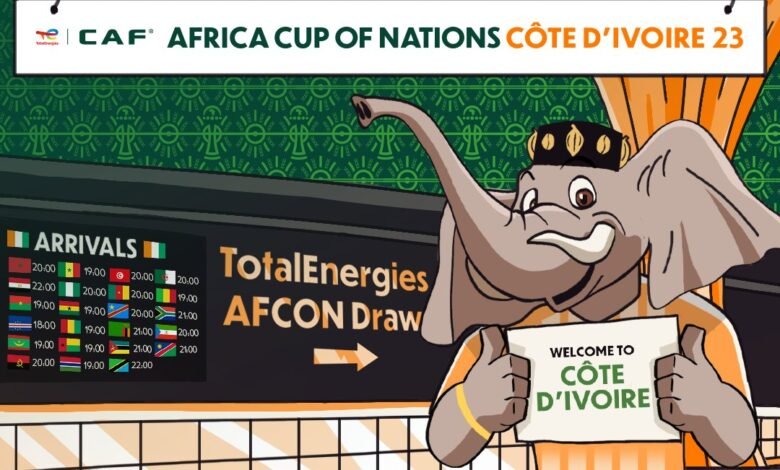Côte d’Ivoire : the economic stakes of the “AFCON of hospitality”
The 34th Africa Cup of Nations kicks off in Côte d'Ivoire. The biggest sporting event on the continent represents a major economic challenge for the host country, with substantial investments and significant benefits, including for local operators.

By Issiaka N’GUESSAN
Abidjan, San Pedro, Yamoussoukro, Bouaké and Korhogo are the cities chosen to host the Africa Cup of Nations (AFCON), which is being held in Côte d’Ivoire for the second time. The first time, in 1984, the country replaced Malawi at short notice. This edition, dubbed the « AFCON of hospitality », has been the subject of considerable investment. At least €762.4 million has been earmarked for the construction of new stadiums in Ebimpé, San Pedro, Yamoussoukro and Korhogo, named after former Prime Minister Amadou Gon Coulibaly, as well as the renovation of the Félix Houphouët-Boigny Stadium and the Peace Stadium in Bouaké.
The hotel sector at the forefront
For Côte d’Ivoire’s business operators, the Africa Cup of Nations appears to be a godsend in terms of boosting their turnover. First and foremost are the construction and public works companies. The Côtière project, which links Abidjan to San Pedro, has mobilized 470 million euros. In addition to the AFCON, this road is of strategic importance to the Ivorian economy and will ultimately boost trade between the two port cities.
In Bouaké, the country’s second largest city, €16.8 million has been disbursed for asphalting and road repairs, as in Korhogo. Porteo BTP and EKDS Nouvelle, owned by Koné Daouda Soukpafolo, are the beneficiaries of these projects.
The hosting of the last edition of the CAF Women’s Champions League gave an idea of the economic impact of such an event. San Pedro and Korhogo were the two cities in the spotlight. The informal sector was one of the beneficiaries. Shea butter producers in Natio-Kobadara, a village in the Korhogo commune, were delighted with the number of visitors. The hotel industry is also thrilled. « I’ve just ordered sheets for my hotel, so I’m ready. I’ve been offered accommodation by the Angolan team, » said manager Kouamé Konan. He claims that « the Africa Cup of Nations has always generated considerable economic interest. It’s up to everyone to prepare to welcome it in their own way.
Evictions create discontent
The downside of this mobilization is the destruction of businesses on the pavements. In Yamoussoukro, the country’s administrative capital, shops belonging to women and young people in the informal sector were destroyed. The same happened in Bouaké. Yaya Koné, chief of staff at the town hall, explains that the aim is to clear the kerbs of illegal residents, most of whom have received formal warnings. « Repeat offenders will be fined. But the large market, built with 61 million euros from the French development agency under the C2D (Contrat de désendettement et de développement), is not yet ready to welcome traders. For the maquis owners, meat braiders and other street vendors, the AFCON is not their business. The bus station has been fenced off, preventing them from entering. The aim of the AFCON regional organizing committees is to improve the appearance of the host cities.
Promoting the economic attractiveness of host cities
During his tour of the airports, Amadou Koné, the Minister of Transport, said at the Bouaké stop that he did not want the AFCON to have a negative impact on economic activity. In the details of the transport plan, lorries were to be blocked in the transit areas at the four cardinal points for the duration of the matches. But Bouaké is a commercial city with a wholesale market. The airport will be closed so that the runway can be upgraded to facilitate the arrival of the delegations of the teams playing at the Stade de la Paix. Bouaké hosts Group B, made up of Burkina Faso, Angola, Mauritania and Algeria. To accommodate the foreign delegations outside Abidjan, the Ivorian government has upgraded the country’s main hotels. « Nearly 1,000 establishments, including hotels, restaurants, maquis, travel agencies and leisure facilities, have been inspected and monitored, » said Siandou Fofana, Minister of Tourism and Leisure.
According to him, this work was carried out « to meet the qualitative and quantitative requirements of the national tourism development strategy, ‘Sublime Côte d’Ivoire’, to bring Ivorian hospitality up to international standards and norms in the run-up to the 2023 Africa Cup of Nations ».
« We have also completely renovated the Sofitel Ivoire in Abidjan at an estimated cost of €4.9 million for the state-owned hotels and €5.6 million for the HP Resort (formerly Le Parlementaire). The President in Yamoussoukro and the Ran Hotel in Bouaké were renovated at a cost of 4.27 million euros each ».
The Minister of Tourism and Leisure explained that the government had made enormous sacrifices to make the stay of foreign delegations as pleasant as possible. « During the lull in the competitions, visitors will be able to visit a number of tourist sites in the region, including the Lovers’ Rocks, the Bay of the Mermaids and the natural swimming pool in San Pedro, » assures Siandou Fofana.
Despite some dissatisfaction, business operators are hoping to make the most of the organization of the AFCON in Côte d’Ivoire. The local organizing committees set up by the national committee have the difficult task of promoting the economic attractiveness of the host cities outside the stadiums. Transport Minister Amadou Koné, who is also the mayor of Bouaké, says he is preparing a business forum around the event to boost the economic appeal of his city, which in 2011 will emerge from the severe military-political crisis that has gripped the country for eight long years.







